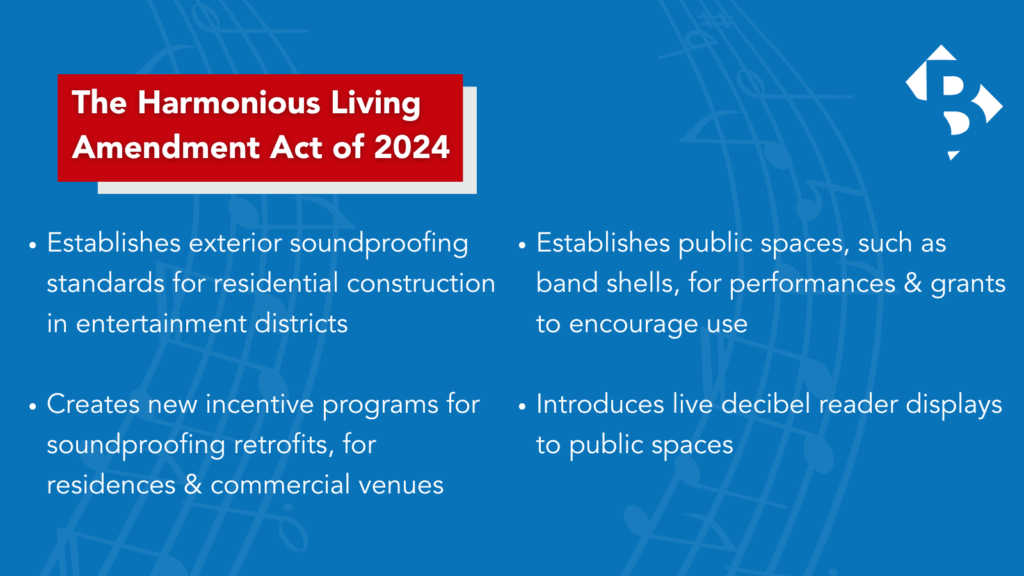Creates shared responsibility for an environment of quality housing, healthy music, and harmonious neighborhoods
Read Councilmember Nadeau’s full remarks on the legislation below.
WASHINGTON, D.C.— Today the D.C. Council passed legislation that sets soundproofing standards for new residential construction in mixed-use corridors and entertainment districts. The legislation, introduced by Councilmember Brianne K. Nadeau, D-Ward 1, protects the vibrant musical and cultural history of neighborhoods while giving relief to the residents who appreciate that culture, and also seek reasonable protections from excessive sound.
“There is a lot of dense urban living here in the District, especially in Ward 1. I believe that diverse, active, and exciting urban neighborhoods are not at odds with providing residents a high quality of life,” Nadeau said. “I believe we can protect and promote the sounds of the District as an essential part of our city’s culture while also giving relief to residents who seek reasonable protections from excessive sound.”
The Council will take a second and final vote on the measure in December.
The Harmonious Living Amendment Act of 2024, introduced by Nadeau, sets higher soundproofing requirements for buildings within 300 feet of a performance venue. Currently, the District does not require any soundproofing standard for building exteriors.
For existing buildings, the bill requires disclosure for leases and home sales when there is nearby entertainment or cultural activity to encourage informed rental and purchase choices. There are incentives for soundproofing and retrofits of existing residences and commercial venues.
The bill also considers how to enhance public spaces for music and public performances in ways that lessen residential disturbance, including amenities like the recently-installed band stand at Eastern Market and public decibel meters in high-activity areas.
“Many residents, including members of the music community – venues, musicians, and performers, have participated in deliberations and helped shape this final version of the legislation, as well as a companion bill that passed out of my Committee yesterday, that directly addresses enforcement of amplified sound. These two pieces of legislation, separately and especially together, will help create an environment of quality housing, lively music, and harmonious neighborhoods.”
###
WHAT THE BILL DOES
Harmonious Living Amendment Act of 2024
- Establishes, for the first time, exterior soundproofing standards for residential construction in mixed-use corridors and entertainment districts, with higher requirements for buildings within 300 feet of a performance venue to address crowds and low frequencies.
- Requires a new disclosure on lease or purchase agreements for existing residential properties in an entertainment or activity area that informs a new renter or buyer of nearby activity and established cultural institutions.
- Creates new incentive programs for soundproofing retrofits, for residences and commercial venues.
- Establishes public spaces and amenities, such as band shells that are more amenable to live performances in ways that reduce residential disturbance.
- Establishes grant programs to encourage public performances that fit well with these spaces and help advance the District’s cultural vibrancy.
- Introduces live decibel reader displays to public spaces to clearly communicate the District’s laws and regulations (but would not be used for enforcement).
- Establishes grant programs to encourage public performances that fit well with these spaces and help advance the District’s cultural vibrancy.
- Ensures that enforcement agencies have a minimum number of sound meters given to staff for enforcement.
REMARKS
There’s a lot of dense urban living here in the District, especially in Ward 1. I believe that diverse, active, and exciting urban neighborhoods are not at odds with providing residents a high quality of life.
In drafting of this bill, we learned a few important things. One, the District’s Noise Ordinance remains largely unchanged from the one passed by the Council in the 1970s. As I’ve spoken with peers in other cities, it became clear that the District’s laws are convoluted and outdated. They don’t work well for enforcing legitimate nuisances, and they don’t work well for positioning the District as a place where musicians are truly welcomed and supported.
Two, we’ve learned that quality residential soundproofing in the U.S. has historically been a suburban privilege. If you review laws establishing soundproofing standards across the country, you’ll notice that many of them are very robust, but they only deal with one of two things: highways and airports. We should be able to provide that kind of sound protection for the sounds of the city, too.
Three, we have a lot of redundancies in District Government that this bill seeks to address. When it comes to enforcing noise ordinances, we have MPD, DOB, DLCP, and ABCA – but residents and businesses have made it clear that enforcement is confusing and ineffective.
When it comes to supporting the music industry, venues, and artists, we have CAH, the Office of Nightlife and Culture, OCTFME, DCPL’s Punk and Go-Go Archive, even DPR’s mobile stages. And yet – DC still seems to fall behind when it comes to making live music, especially live music in public spaces, an abundant and cherished part of our culture. The sounds of the District are an essential part of our city’s culture, and I believe we can protect and promote that while also giving relief to residents who seek reasonable protections from excessive sound.
Many residents, including members of the music community – venues, musicians, and performers, have participated in deliberations and helped shape this final version of the legislation, as well as a companion bill that passed out of my Committee yesterday, that directly addresses enforcement of amplified sound. These two pieces of legislation, separately and especially together, will help create an environment of quality housing, lively music, and harmonious neighborhoods. The Harmonious Living Act came from the same moment that birthed the Don’t Mute DC movement – even with the time that’s passed, it’s clear the need for it is still present. I want to thank the Chairman for his partnership on this bill and I ask my colleagues for their support.
